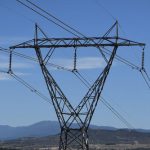Around The Web
Reef scientist Terry Hughes awarded prize for standing up to political ‘smears’
Coral reef scientist jointly awarded John Maddox prize weeks after his research centre lost government funding
Judges have awarded an Australian scientist a prestigious international prize, saying he has battled political smears and public attempts to discredit his work in order to shine a light on the devastating effects of climate change on coral reefs.
Prof Terry Hughes was jointly awarded the John Maddox prize on Wednesday for bringing public attention to coral bleaching.
Continue reading...Germany’s electricity grid stable amid energy transition
 Germany's grid - even in midst of shift to renewables - remains one of most stable in Europe, as biggest threat comes from extreme weather.
Germany's grid - even in midst of shift to renewables - remains one of most stable in Europe, as biggest threat comes from extreme weather.
The post Germany’s electricity grid stable amid energy transition appeared first on RenewEconomy.
Spain bans petrol cars, fracking, fossil fuel subsidies – aims for 100% renewables
 Spain proposes new laws banning petrol vehicles, fracking, scraps fossil fuel subsidies and sets 2050 goal for 100% renewable power.
Spain proposes new laws banning petrol vehicles, fracking, scraps fossil fuel subsidies and sets 2050 goal for 100% renewable power.
The post Spain bans petrol cars, fracking, fossil fuel subsidies – aims for 100% renewables appeared first on RenewEconomy.
Queenslander escapes four-metre tiger shark that attacked his kayak
Man used radio to contact coast guard after shark rammed and bit his craft and sent him flying into the ocean on the Sunshine Coast
A kayaker has been sent flying after a four-metre tiger shark rammed and then sank its teeth into his tiny craft on Queensland’s Sunshine Coast.
The man, aged in his 30s, was fishing from his kayak off Moffat beach on Thursday morning when he was flung into the water, surfacing to find the shark with its jaws still clamped around one end.
Continue reading...'Cut lamb and beef' to fight climate change
Climate Governance Manager, C40 Cities Climate Leadership Group – London
Vestas wins largest project in Victoria’s Renewable Energy Auction with the first V150-4.2MW turbines in Australia
 The project is the largest of six successful bids underVictoria's928 MW Renewable Energy Auction Scheme, and the second winning project backed by Vestas' customised solutions.
The project is the largest of six successful bids underVictoria's928 MW Renewable Energy Auction Scheme, and the second winning project backed by Vestas' customised solutions.
The post Vestas wins largest project in Victoria’s Renewable Energy Auction with the first V150-4.2MW turbines in Australia appeared first on RenewEconomy.
Internship – Sustainable Energy Policy and Markets, SD Strategies – Berlin
Tree planting in UK 'must double to tackle climate change'
Government advisers call for radical changes, including turning farmland into forests
Tree planting must double by 2020 as part of radical changes to land use in the UK, according to the government’s advisers on climate change.
New forests would lock up carbon but also help to limit the more frequent floods expected with global warming.
Continue reading...Diesel pollution stunts children’s lung growth, London study shows
Major research also shows charging polluting trucks had no effect on health
Pollution from diesel vehicles is stunting the growth of children’s lungs, leaving them damaged for life, a major study has found.
The research, conducted with more than 2,000 school children in London, is the first such study in a city where diesel pollution is a significant factor, and has implications for cities around the world. It also showed that charges to deter polluting trucks from entering the city did reduce air pollution a little but did not reduce the harm to children’s lungs.
Continue reading...CP Daily: Wednesday November 14, 2018
Crab fishermen sue 30 oil firms, saying climate change has battered industry
Fossil fuel companies including Chevron and ExxonMobil ‘knowingly caused harm’ by contributing to warming, group says
For the fourth-generation crab fisherman John Beardon, the warming of Pacific waters off the coast of California has meant toxic crabs, shortened fishing seasons and a near decimation of his livelihood as a crab boat captain. Now he would like to see the industry he says is responsible pay for the damage.
On Wednesday, associations representing California crab fishermen like Beardon filed suit against 30 fossil fuel companies seeking to make the companies pay for the harm global warming has caused to California’s fisheries. The suit demands that petroleum interests finance the changes that will be needed to sustain the crab fishing industry in the future.
Continue reading...Energy Estate, MirusWind propose 4GW wind and solar project in NSW
 Energy Estate and MirusWind propose 4GW wind and solar project with storage in NSW - the largest single renewable energy project in Australia's main grid.
Energy Estate and MirusWind propose 4GW wind and solar project with storage in NSW - the largest single renewable energy project in Australia's main grid.
The post Energy Estate, MirusWind propose 4GW wind and solar project in NSW appeared first on RenewEconomy.



